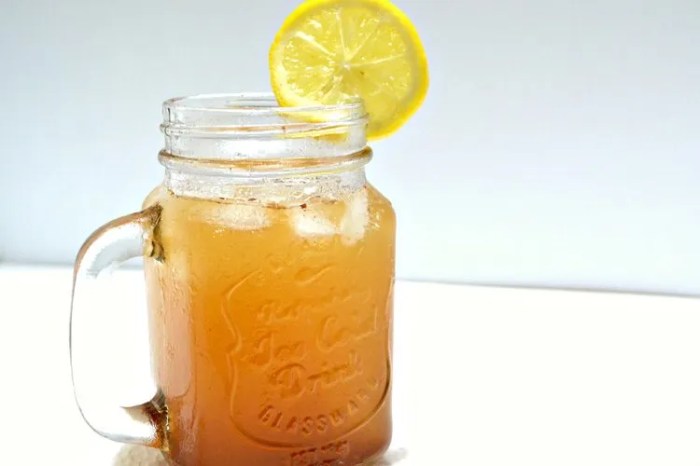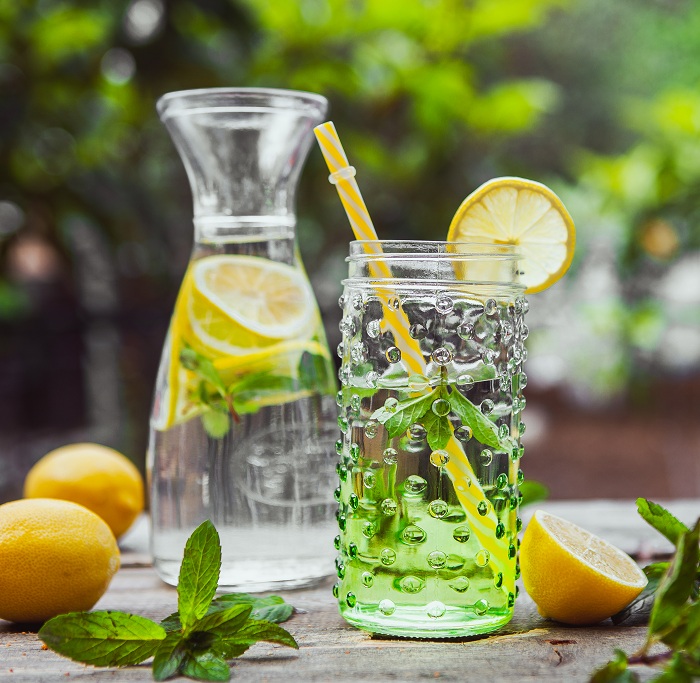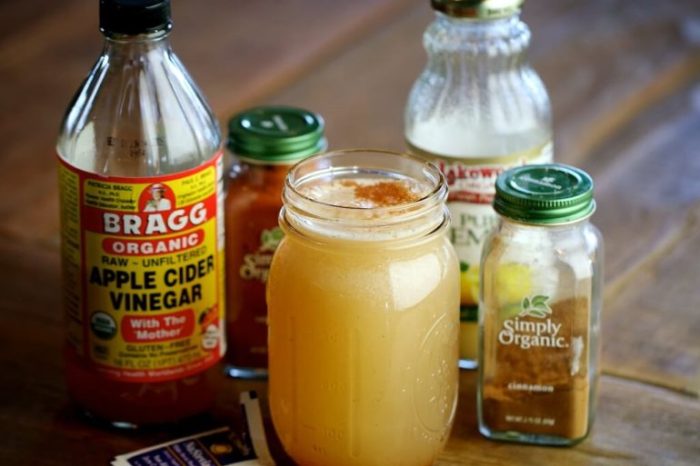DIY detox drinks have gained immense popularity in recent years, with many people seeking natural ways to cleanse and revitalize their bodies. These beverages, often made with simple ingredients like fruits, vegetables, and herbs, promise a range of health benefits, from boosting energy levels to supporting digestion and promoting weight management. But are detox drinks truly effective? And are there any risks associated with them?
This article delves into the world of DIY detox drinks, exploring their potential benefits and drawbacks, providing insightful recipes, and debunking common myths. We’ll also discuss the importance of a balanced diet and lifestyle for overall health and well-being.
Creating Your Own Detox Drink Recipes
Detox drinks are a popular way to cleanse your body and improve your overall health. While there is no scientific evidence to support the idea of a “detox” in the way it is often marketed, these drinks can still be a refreshing and nutritious way to boost your intake of fruits, vegetables, and other beneficial ingredients. By creating your own detox drinks, you can customize them to your specific needs and preferences, ensuring you get the most out of your daily intake.
Understanding the Benefits of Detox Drink Ingredients
The key to creating effective detox drinks lies in understanding the potential health benefits of various ingredients. Here’s a table showcasing some popular ingredients and their associated benefits:
| Ingredient | Potential Health Benefits |
|---|---|
| Lemon | Rich in vitamin C, an antioxidant that supports immune function. Citric acid aids digestion. |
| Ginger | Known for its anti-inflammatory properties and ability to soothe nausea. |
| Turmeric | Contains curcumin, a powerful anti-inflammatory compound with potential benefits for brain health. |
| Apple Cider Vinegar | May aid in digestion and blood sugar control. |
| Cayenne Pepper | Can boost metabolism and aid in weight management. |
| Cucumber | Hydrating and low in calories, cucumber is a good source of vitamins and minerals. |
| Spinach | Packed with vitamins, minerals, and antioxidants, spinach supports overall health. |
| Parsley | A good source of vitamins K and C, parsley also acts as a natural diuretic. |
Detox Drink Recipes for Different Goals
You can tailor your detox drinks to address specific health goals:
Energy Boosting
- Ginger-Lemon Energy Drink: Combine 1/2 cup of water, 1 tablespoon of lemon juice, 1/2 inch of grated ginger, and a pinch of cayenne pepper. Blend until smooth and enjoy.
- Green Smoothie: Blend 1 cup of spinach, 1/2 banana, 1/2 cup of pineapple, 1/4 cup of water, and a tablespoon of chia seeds for a nutrient-rich energy boost.
Digestion Support
- Apple Cider Vinegar Drink: Mix 1 tablespoon of apple cider vinegar with 8 ounces of water and a squeeze of lemon juice. Drink before meals to aid digestion.
- Cucumber-Mint Detox Water: Infuse a pitcher of water with cucumber slices, mint leaves, and a squeeze of lemon juice for a refreshing and digestive-friendly drink.
Weight Management
- Lemon-Cucumber Detox Drink: Combine 1 cup of water, 1/2 lemon, and 1/2 cucumber, blended until smooth. This low-calorie drink can help you feel full and hydrated.
- Green Tea with Lemon: Steep a cup of green tea and add a squeeze of lemon juice for a refreshing and metabolism-boosting drink.
Creating Your Own Personalized Detox Drink
- Identify your goals: What are you hoping to achieve with your detox drink? Are you looking for an energy boost, improved digestion, or weight management support?
- Choose your ingredients: Select ingredients based on their potential benefits and your personal preferences. Refer to the table above for inspiration.
- Experiment with proportions: Start with a basic recipe and adjust the amounts of each ingredient to find your ideal balance of flavors and benefits.
- Add a sweetener (optional): If you prefer a sweeter drink, use natural sweeteners like honey or stevia.
- Enjoy your creation: Sip on your detox drink throughout the day to stay hydrated and support your health goals.
Remember, detox drinks should be considered a supplement to a healthy diet and lifestyle, not a replacement for them.
Detoxification Myths and Misconceptions: Diy Detox Drinks
The concept of detoxifying your body has become increasingly popular, with many individuals seeking quick fixes to cleanse their systems and improve their health. However, it’s essential to separate fact from fiction when it comes to detox drinks and their purported benefits. While a healthy lifestyle is crucial for overall well-being, relying solely on detox drinks can be misleading and potentially harmful.
Potential Risks of Extreme Detox Diets
Extreme detox diets often involve drastic restrictions, such as eliminating entire food groups or consuming only liquids for extended periods. These restrictive diets can lead to several potential risks, including:
- Nutritional Deficiencies: By eliminating essential nutrients, extreme detox diets can lead to vitamin and mineral deficiencies, weakening your immune system and causing fatigue, hair loss, and other health problems.
- Dehydration: Many detox diets encourage excessive fluid intake, which can lead to electrolyte imbalances and dehydration.
- Digestive Issues: Restricting fiber intake or consuming large amounts of certain fruits and vegetables can cause digestive problems like diarrhea, constipation, and bloating.
- Kidney and Liver Strain: Your kidneys and liver are responsible for naturally detoxifying your body. Excessive consumption of detox drinks can put extra strain on these organs, potentially causing damage in the long run.
It’s crucial to remember that your body is designed to naturally eliminate toxins through its organs. While some detox drinks may temporarily improve your digestive health, they cannot magically flush out toxins or offer a long-term solution for overall well-being.
Importance of a Balanced Diet and Lifestyle
Instead of relying on detox drinks, focus on adopting a balanced diet and lifestyle that promotes natural detoxification. Here are some key principles:
- Consume a Variety of Fruits and Vegetables: These foods are rich in antioxidants and fiber, which help support your body’s natural detoxification processes.
- Stay Hydrated: Drinking plenty of water is essential for flushing out toxins and keeping your organs functioning optimally.
- Limit Processed Foods and Sugary Drinks: These foods can contribute to inflammation and oxidative stress, hindering your body’s natural detoxification processes.
- Get Regular Exercise: Physical activity helps boost your metabolism and improve circulation, aiding in the elimination of toxins.
- Manage Stress: Chronic stress can suppress your immune system and impair your body’s ability to detoxify.
By incorporating these healthy habits into your daily routine, you can support your body’s natural detoxification processes and promote overall well-being. Remember, a balanced diet and lifestyle are far more effective than relying on gimmicky detox drinks.
Tips for Effective Detoxification

While detox drinks may offer a temporary boost, true detoxification involves a holistic approach that encompasses lifestyle changes. By incorporating these practices into your daily routine, you can support your body’s natural cleansing processes and enhance overall well-being.
Hydration
Staying hydrated is crucial for detoxification. Water helps flush out toxins, supports kidney function, and aids in digestion. Aim to drink plenty of water throughout the day, especially before, during, and after exercise. You can also include herbal teas, such as dandelion or ginger tea, which have diuretic properties that can help promote detoxification.
Sleep
Adequate sleep is essential for the body’s natural detoxification processes. During sleep, the liver works to filter toxins from the bloodstream. Aim for 7-8 hours of quality sleep each night to allow your body to rest and repair.
Stress Management
Chronic stress can disrupt the body’s natural detoxification processes. Find healthy ways to manage stress, such as exercise, meditation, yoga, or spending time in nature. Engaging in activities you enjoy can help reduce stress levels and promote relaxation.
Physical Activity
Regular exercise helps boost circulation, which in turn helps to remove toxins from the body. Aim for at least 30 minutes of moderate-intensity exercise most days of the week. This could include brisk walking, swimming, cycling, or dancing.
Mindfulness Practices
Mindfulness practices, such as meditation or deep breathing exercises, can help to reduce stress and promote relaxation, which are both important for detoxification. By focusing on the present moment, you can create a sense of calm and clarity, allowing your body to naturally cleanse and restore itself.
Detoxification and Environmental Toxins

Environmental toxins are substances that can harm our health when we’re exposed to them. They can come from many sources, including air, water, food, and consumer products. Exposure to environmental toxins can have a range of effects on our bodies, from mild symptoms like headaches and fatigue to more serious health problems like cancer and birth defects.
Common Sources of Environmental Toxins
Environmental toxins can be found in many places, both indoors and outdoors. Here are some common sources:
- Air pollution: Air pollution is a major source of environmental toxins, and it can come from both natural and human-made sources. Some common sources of air pollution include vehicle emissions, industrial processes, and wildfires.
- Water pollution: Water pollution can come from a variety of sources, including industrial waste, agricultural runoff, and sewage. These pollutants can contaminate drinking water and make it unsafe to drink.
- Food contamination: Food can become contaminated with environmental toxins through a variety of pathways. For example, pesticides can be used on crops, and heavy metals can accumulate in fish.
- Consumer products: Many consumer products contain chemicals that can be harmful to our health. For example, some plastics contain bisphenol A (BPA), which has been linked to health problems.
Potential Effects of Environmental Toxins, Diy detox drinks
Exposure to environmental toxins can have a range of effects on our health. Some common effects include:
- Respiratory problems: Air pollution can irritate the lungs and cause respiratory problems like asthma and bronchitis.
- Cardiovascular disease: Air pollution has been linked to an increased risk of heart attacks and strokes.
- Cancer: Exposure to certain environmental toxins, such as asbestos and benzene, has been linked to an increased risk of cancer.
- Neurological disorders: Exposure to some environmental toxins, such as lead and mercury, can damage the nervous system and lead to neurological disorders.
- Reproductive problems: Exposure to some environmental toxins can interfere with reproductive health and increase the risk of infertility and birth defects.
Tips for Minimizing Exposure to Environmental Toxins
There are a number of things you can do to minimize your exposure to environmental toxins:
- Choose organic foods whenever possible: Organic foods are grown without the use of pesticides and herbicides, which can reduce your exposure to these toxins.
- Filter your drinking water: A water filter can remove contaminants like chlorine and heavy metals from your drinking water.
- Avoid using harsh chemicals: Choose natural cleaning products and personal care products that are free of harmful chemicals.
- Ventilate your home: Open your windows and doors regularly to allow fresh air to circulate and reduce indoor air pollution.
- Be aware of your surroundings: Pay attention to your surroundings and avoid areas with known sources of pollution, such as busy roads and industrial areas.
Detoxification and Alternative Therapies

Detoxification is a natural process that helps the body eliminate waste and toxins. While the body is capable of detoxifying itself, some individuals may seek alternative therapies to support this process. These therapies often focus on promoting overall health and well-being, which can indirectly contribute to detoxification.
Alternative therapies, such as acupuncture, massage, and herbal remedies, are often used in conjunction with conventional medical practices to enhance detoxification. It’s important to understand that these therapies are not intended to replace conventional medical treatments but rather to complement them.
Acupuncture
Acupuncture is a traditional Chinese medicine practice that involves inserting thin needles into specific points on the body. Practitioners believe that these points stimulate the flow of energy, known as qi, and promote healing. While acupuncture’s role in detoxification is not fully understood, some studies suggest that it may help to stimulate the lymphatic system, which plays a role in removing waste from the body.
Massage
Massage therapy involves manipulating the soft tissues of the body to promote relaxation and reduce stress. Massage can also improve circulation, which can help to transport toxins away from the body. Additionally, massage can help to release tension and improve lymphatic drainage, both of which contribute to detoxification.
Herbal Remedies
Herbal remedies have been used for centuries to support health and well-being. Some herbs, such as dandelion root, milk thistle, and turmeric, are believed to have detoxifying properties. These herbs may help to support the liver, kidneys, and digestive system, which are all involved in the detoxification process.
Detoxification and Mental Well-being
The connection between detoxification and mental health is a fascinating area of study. While we often focus on the physical aspects of detoxification, the impact on our mental state is equally important.
Our mental and physical health are interconnected, and this is particularly true when it comes to detoxification. When we are stressed or anxious, our bodies release hormones like cortisol, which can disrupt our natural detoxification processes. This can lead to a buildup of toxins, which in turn can contribute to feelings of stress, anxiety, and even depression.
Stress and Anxiety’s Impact on Detoxification
Stress and anxiety can significantly impact our body’s detoxification processes in several ways:
* Disruption of the Liver’s Function: The liver is our primary detoxification organ, and chronic stress can impair its ability to filter toxins effectively.
* Increased Inflammation: Stress hormones contribute to inflammation throughout the body, which can further hinder detoxification.
* Impaired Gut Health: Stress can disrupt the balance of gut bacteria, which plays a crucial role in detoxification.
* Hormonal Imbalances: Stress hormones can disrupt the delicate balance of hormones in the body, which can also impact detoxification pathways.
Stress-Reducing Practices for Detoxification
Incorporating stress-reducing practices into your detox program can be beneficial for both your physical and mental well-being:
* Mindfulness Meditation: Regular mindfulness meditation can help calm the nervous system, reducing stress hormone production and promoting relaxation.
* Deep Breathing Exercises: Deep breathing exercises, such as diaphragmatic breathing, can help to oxygenate the body and reduce stress.
* Yoga and Tai Chi: These practices combine physical movement with mindfulness, offering a holistic approach to stress reduction.
* Spending Time in Nature: Being in nature has been shown to have a calming effect on the mind and body.
* Adequate Sleep: Getting enough sleep is essential for optimal detoxification and stress management.
* Social Connection: Strong social connections can provide a buffer against stress and promote overall well-being.
* Healthy Diet: Eating a balanced diet rich in fruits, vegetables, and whole grains can provide the nutrients your body needs to support detoxification and manage stress.
Incorporating DIY detox drinks into your daily routine can be a refreshing and enjoyable way to support your body’s natural cleansing processes. However, it’s crucial to remember that detox drinks are not a substitute for a healthy lifestyle. By embracing a balanced diet, regular exercise, and stress management techniques, you can promote optimal health and well-being from the inside out. Always consult with a healthcare professional before starting any new dietary or detox program.
DIY detox drinks are a popular way to cleanse and refresh the body, but sometimes you need a little more than just a healthy beverage. If you’re looking for a fun and interactive way to enjoy a detox, consider building your own DIY bar at home! Check out this great resource on DIY bar PDX for inspiration.
You can set up a station with various ingredients and recipes for detox drinks, allowing guests to create their own customized concoctions.
